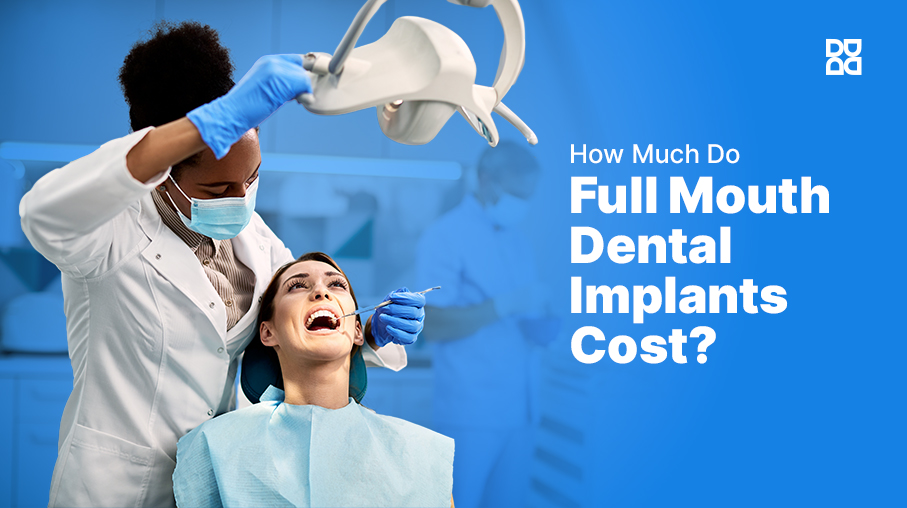
Every year, thousands of Americans spend somewhere around $24,000 on all-on-4 dental implants, and for good reason. With a 98.2% success rate, these implants are an excellent option for patients who have lost most of their teeth and want a permanent solution instead of temporary dentures.
These have fixed dental arches supported by four implant points (abutments) to replace the full arch of teeth without needing to install individual dental implants.
Worried About Root Canal Expenses?
Say Goodbye to Toothache and High Costs: Learn About Our Budget-Friendly Root Canal Treatment Payment Plans That Work for You!
All-on-4 dental implants cost anywhere from a minimum of $21,000 to a maximum of $50,000+ (including the upper and lower arch). However, on average, patients may spend $12,000 to $25,000 per arch.
So, if you are thinking about getting this treatment, keep reading to learn how much all-on-4 dental implants cost with insurance, the factors that affect the cost, and explore ways to afford them without insurance.
Breakdown Of Average All-On-4 Dental Implants Cost Per Arch:
The cost of dental implants is usually broken down into three main components that vary and contribute to the overall expense:
- Implant - $1,500 to $2,000
- Abutment - $300 to $500
- Crown - $1,000 to $3,000
So, as you can probably guess, the cost of full-mouth dental implants can be quite expensive (i.e., $50,000 to $80,000+ on average). However, all-on-4 dental implants usually require 4, 6, or 8 implants for full arch installation. Accordingly, the cost can be anywhere from $21,000 to $40,000+.
Here’s a comprehensive cost overview for your reference:
| Factors | All-On-4 Dental Implants Cost | Full Dental Implants Cost |
|---|---|---|
| Initial consultation | $100–$300 | $50–$300 |
| X-ray, CT scan, & other tests | $400–$700 | $250–$1,000 |
| Tooth extraction (if needed) | $150–$700 (per tooth) | $150–$700 (per tooth) |
| Anesthesia | $500–$2000 | $500–$2000 |
| Bone graft | $450–$800 per graft (if needed) | Simple: $200–$1,200 Complex: $2,500–$3,500 |
| Sinus lift (if needed) | - | $1,500–$2,500 |
| Temporary dentures (per arch) | $1,000–$1,500 | - |
| Single-arch dental implants cost (including surgeon’s fee) | $8,000–$16,000 (per arch, 4–8 implant points) | $25,000–$55,000+ |
| Dental prosthetics (per arch) | $10,000–$18,000 | $15,000–$18,000 |
| Total Average Cost | $21,100–$40,000 | $45,150–$83,000 |
| ** These are estimated costs updated as of December 2023. However, actual costs can vary based on the patient’s needs, location, material used, and other factors. It is crucial to consult a licensed dental expert for a more personalized and accurate cost estimate. | ||
All-On-4 Dental Implants Cost Based on Types of Implants
Titanium and zirconium are two of the most popular materials used to make these implants.
Titanium is the most prevalent material used widely in dentistry due to its high success rate and durability. It typically costs $1,500 to $5,000 per implant.
Zirconia is another durable material that is becoming popular as it gives a more natural look and is a metal-free option. It provides greater strength and durability than titanium implants. However, due to the complexity of manufacturing, zirconia bridge-supported dental implants are usually more expensive, ranging from $1,500 to $7,000 per implant.
All-On-4 Dental Implants Cost Breakdown by State
The cost may also vary significantly based on your geographic location. Here’s an overview of the average cost in different states:
| State | Average Cost (Per Arch 4–8 implants) |
|---|---|
| California | $14,000–$38,000 |
| Texas | $16,000–$40,000 |
| Florida | $22,000–$31,000 |
| New York | $14,000–$35,000 |
| Pennsylvania | $15,000–$24,000 |
| Illinois | $13,500–$34,000 |
| Ohio | $18,000–$25,000 |
| Georgia | $15,000–$30,000 |
| North Carolina | $20,000–$30,000 |
| Michigan | $15,000–$24,000 |
| New Jersey | $20,000–$40,000 |
| Virginia | $15,000–$28,000 |
| Washington | $20,000–$35,000 |
| Arizona | $27,000–$32,000 |
| Tennessee | $15,000–$30,000 |
| Indiana | $19,200–$38,400 |
| Missouri | $19,000–$37,000 |
| Wisconsin | $12,000–$39,200 |
It is crucial to note that these costs are subject to change based on various additional factors, such as surgeon’s fees, special equipment, additional bone grafts, or other costs. Hence, it's best to consult with a board-certified dental surgeon for an accurate cost estimate.
How Much Do All-On-4 Dental Implants Cost With Insurance?
Dental coverage can differ depending on the insurer. For instance, your dental insurance plan may cover the cost if this treatment falls under qualified treatments and is deemed medically necessary.
If the insurance providers offer partial coverage, you may be responsible for paying some out-of-pocket costs. In that case, flexible payment plans can help you manage paying the remaining costs in easy installments.
However, in many cases, insurance does not cover all-on-4 dental implants. So, it's recommended to check your insurance policy or consult your provider to see if they can cover all-on-4 dental implant costs with insurance, and to what extent.
How to Pay for Dental All-on-4 Implants Cost Without Insurance?
If insurance isn’t a viable option, several other ways can help you cover the cost, including:
- Discount Dental Plans
These can help reduce the overall cost of dental procedures, such as tooth implants. The applicants may need to pay an annual fee, and they can access the required services from any in-network dentist that provides all-on-4 dental implants at a flat discount rate.
- Flexible Payment Plans
Nowadays, many dental practices use Denefits to offer on-demand payment plans to patients. Denefits has a ‘No Credit Check’ policy, which makes it a more accessible option for patients from any financial background. This way, you can make affordable monthly payments to cover the cost of implants without needing any medical loans.
- Flexible Spending Account (FSA) or Health Savings Account (HSA)
If you have a high-deductible health insurance plan, you can use your FSA or HSA funds to pay. But first, you should check if the dental all-on-4 implant cost is covered under the specified treatments.
- Medical Credit Cards:
If you qualify for CareCredit, AccessOne, Medkey, or any other medical credit card, you can use it to pay for dental implants. They work similar to other credit cards. So be sure to make your payments on time to avoid accumulating medical debt and maintain your credit scores.
Final Thoughts
All-on-4 dental implants are emerging as an alternative to temporary dentures and full-mouth dental implants. These help eliminate the shortcomings of removable dentures and provide a more permanent solution. Additionally, those who can’t afford full-mouth dental implants cost can opt for all-on-4 dental implants.
If your dental insurance covers this treatment, it's the best way to restore your smile and confidence. For uninsured patients, flexible payment plans can be the most viable option. This way, they can pay in manageable monthly installments with less risk of incurring medical debt. Moreover, the payment plan terms are much more flexible than the rigid terms of medical credit cards and third-party financing companies.
Want to learn more or have any questions? Write to us for expert assistance.
1. Are All-On-4 Dental Implants A Good Alternative To Full Mouth Dental Implants?
On average, a single dental implant can cost around $1500 to $2,000 (excluding the cost of the dental crown). Therefore, the average cost of full-mouth dental implants is about $52,000, with lower-end costs ranging from $40,000 to $90,000 on the high end.
On the other hand, all-on-4 dental implants support 4–8 implant points to support a full arch of artificial teeth, which costs up to $15,000 per arch. So, these are relatively less expensive.
2. What’s The Lowest And Highest Cost For All-On-4 Dental Implants?
The all-on-4 dental implants can cost $10,950 per arch on the lower end, excluding associated costs. But depending on the location, quality of materials, surgeon’s expertise, and other factors, the highest cost can be up to $50,000+. However, realistically speaking, the average cost in most states is usually around $12,000 to $18,000 per arch without insurance.
3. What’s The Best Way To Pay For All-On-4 Dental Implants?
Paying for all-on-4 dental implant costs with insurance is the best way. However, if the insurance doesn’t cover the procedure, there are various alternatives available for uninsured patients. For instance, flexible payment plans are the top choice for many as they allow patients to pay via monthly, affordable installments.
Nowadays, many providers offer ‘No Credit Check’ payment plans using Denefits, which is ideal for patients who don’t qualify for insurance and don’t want to use medical credit cards to avoid medical debt. Additionally, the payment plans can be customized in terms of duration, i.e., 3 months to 48 months, per the customer’s preferences.
So, you can consult with your provider regarding your preferred payment option and select a payment plan that fits your budget to get your all-on-4 dental implants.


